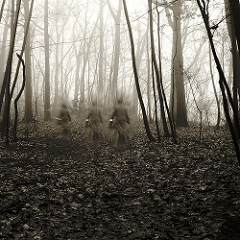 "I don’t believe in ghosts," I told her, "even though I want to."
"I don’t believe in ghosts," I told her, "even though I want to."
That was different enough from either of my co-worker’s opinions for them to stop and look at me. I took another breath and jumped further into the breach.
"After our cat died," I said, "I saw him for the next few months." One co-worker scoffed, while the other started to agree with me… but I cut her off. "But I don’t know that I did see him. I wanted to, sure. I want to believe that our cat is in a better place, or watching over us, but that’s not proof."
"But you saw him," the believer protested.
"That’s not proof, though. People love to see things and patterns that aren’t really there. I can’t tell you whether or not my brain was simply fooling me."
This is the dilemma that Descartes found himself up against a few hundred years ago. (I’m writing this (and these other papers) so you don’t have to read it; Descartes may have been a genius, but he could have used a good editor.)
He realized that a demon could hypothetically alter his perceptions. How could he know that reality existed? How could he know what was real?
It is from this dilemma that his most famous statement comes: "I think, therefore I am." Because no matter what alters the sensory perceptions, the act of reflecting on them implies a real actor being able to reflect.
 This, in turn, opens the road to dualism and the idea that the body and senses are not the same thing as the intellect, It’s this dualism that leaves the way open to rationally consider in a separate spirit from the biology of the body… and therefore, ghosts.
This, in turn, opens the road to dualism and the idea that the body and senses are not the same thing as the intellect, It’s this dualism that leaves the way open to rationally consider in a separate spirit from the biology of the body… and therefore, ghosts.
I would love to see evidence – preferably through Randi’s challenge – of the paranormal. But until there’s evidence outside my own head, outside my own senses, it seems that all I have is this untrustworthy narrator of a brain.
